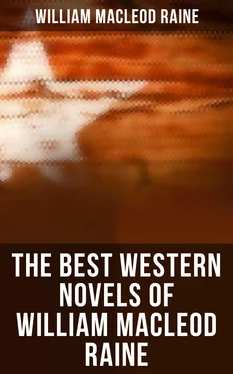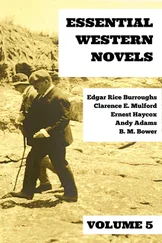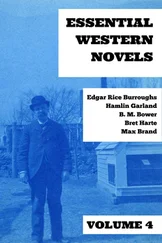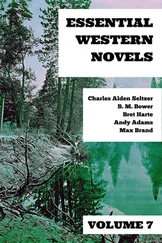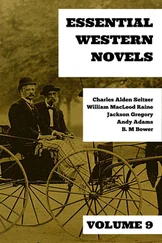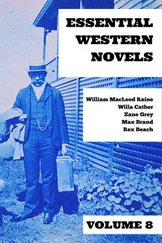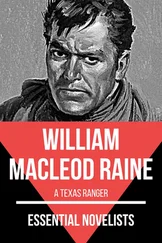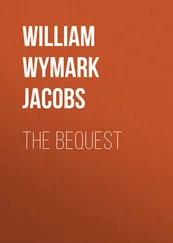At his call light-stepping dusty men poured from the building like seeds from a squeezed orange. There was a rush for the girl. She was lifted from her saddle and carried in triumph to the porch. Jim Sanderson came running from the cellar in the rear and buried her in his arms.
She broke down and began to cry a little. "Oh, Dad—Dad, I'm so glad to be home."
The old Confederate veteran was close to tears himself.
"Honey, I jes' got back from town. Phil, he done wrong not letting me know. I come pretty nigh giving that boy the bud. Wait till I meet up with Buck Weaver. It's him or me for suah this time."
"No, Dad, no! You must let me explain. I've been quite safe, and it's all over now. Everything is all right."
"Is it?" Sanderson laughed harshly.
"The sheriff telephoned him to keep me, but you see he brought me home."
"Brought you home?" The sheepman's black eyes lifted quickly and met those of his enemy.
"So you're there, Buck Weaver. I reckon you and I will settle accounts."
Phil and Tom Dixon had quietly circled round so as to cut off Weaver's retreat in case he attempted one.
"He's got the rustler with him," Tom Dixon cried quickly.
"Goddlemighty, so he has. We'll make a clean sweep," the Southerner cried, his eyes blazing.
"Then you'll destroy the man who was ready to give his life for mine," his daughter said quietly.
"What's that? How's that, Phyllie?"
"It's a long story. I want you to hear it all. But not here."
Her voice fell. A sudden memory had come to her of one thing at least that she could not tell even to him—the story of that moment when she had lain in the arms of the nester with his heart beating against her breast.
The old man caught her by the shoulder, holding her at arm's length, while the deep eyes under his shaggy, grizzled brows pierced her.
"What have you got to tell me, gyurl? Out with it!"
But on the heels of his imperative demand came reassurance. A tide of color poured into her face, but her eyes met his quietly. They let him understand, more certainly than words, that all was well with his ewe lamb. Putting her gently to one side, he strode toward his enemy.
"What are you doing here, Buck Weaver?"
The cattleman swept the circle of lowering faces, and laughed contemptuously. "A man might think I wasn't welcome if he didn't know better."
"Oh, you're welcome—I reckon nobody on earth is more welcome right now," retorted Sanderson grimly. "We were starting right out after you, seh. But seeing you're here it saves trouble. Better 'light, you and your friend, both."
The declining sun flashed on three weapons that already covered the cattleman. He looked easily from one to another, without the least concern, and swung lightly from his horse.
"Much obliged. Glad to accept your hospitality. But about this young man here—he's not exactly a friend of mine—a mere pick-up acquaintance, in fact. You mustn't accept him on my say-so. Of course, you know I'm all right, but I can't guarantee him ," Buck drawled, with magnificent effrontery.
Phyllis spoke up unexpectedly. " I can."
Keller looked at her gratefully. It was not that he cared so much for the certificate of character as for the friendly spirit that prompted it. "That's right kind of you," he nodded.
"We haven't heard yet what you are doing here, Buck Weaver," old Jim Sanderson said, holding the cattleman with a hard and hostile eye. "And after you've explained that, there are a few other things to make clear."
"Such as——" suggested the plainsman.
"Such as keeping my daughter a captive and insulting her while she was in your house," the father retorted promptly.
"I held her captive because it was my right. She admitted shooting me. Would you expect me to turn her loose, and thank her right politely for it? I want to tell you that some folks would be right grateful because I didn't send her to the penitentiary."
"You couldn't send her there. No jury in Arizona would convict—even if she were guilty," Tom Dixon broke out.
"That's a frozen fact about the Arizona jury," the cattleman agreed, with a swift, careless look at the boy. "Just the same, I had a license to hold her. About the insult—well, I've got nothing to say. Nothing except this, that I wouldn't be wearing these decorations"—he touched the scars on his face—"if I didn't agree with you that nobody but a sweep would have done it."
"Everybody unanimous on that point, I reckon," said Jim Yeager promptly.
Phyllis had been speaking to her father in a low voice. The old man listened with no great patience, but finally nodded a concession to her importunity.
"We'll waive the matter of the insult just now. How about that boy you shot up? Looks like you're a fool to come drilling in here, with him still lying there on his bed."
"He took his fighting chance. You ain't kicking because I played out the game the way you-all started to play it? If you are, I'll have to say I might have expected a sheep herder to look at it that way," Weaver retorted insolently.
The old man took a grip on his rising wrath. "No—we're not kicking, any more than you've got a right to kick when we settle accounts with you."
"As we're liable to do right shortly, now we've got you," said Dixon, vindictively.
"All right—go ahead with the indictment," Weaver acquiesced quietly, ignoring the boy.
"Keep still, Tom," Sanderson ordered, and went on with his grievance. "You try to run this valley as if you were God Almighty. By your way of it, a man has to come with hat in hand to ask you if he may take up land here. The United States says we may homestead, but Buck Weaver says we shan't. Uncle Sam says we may lease land to run sheep. Buck Weaver has another notion of it. We're to take orders from him. If we don't he clubs our sheep and drives off our cattle."
"Cattle were here first," retorted Weaver. "The range is overstocked, and they've got a prior right. Nesters in the hills here are making money by rustling Twin Star calves. That's another thing."
"Some of them. You'll not find any rustled calves with the Seven Mile brand on them. And we don't recognize any prior right. We came here legally. We intend to stay. Every time your riders club a bunch of our sheep, we'll even up on Twin Star cattle. You take my daughter captive; I hold you prisoner."
"You'll be in luck if you get away from here with a whole skin," broke out Phil. "You came here to please yourself, but you'll stay to please us."
"So?" Buck smiled urbanely. He was staying because he wanted to, though they never guessed it.
"Unbuckle his gun belt, Tom," ordered the old man.
"Save you the trouble." Weaver unbuckled the belt and tossed it, revolver and all, to Yeager.
"Now, Mr. Weaver, we'll adjourn to the house."
"Anything to oblige."
"What about Mr. Keller?" Phyllis asked, in a low voice, of her father.
The old man's keen, hard eyes surveyed the stranger. "Who is he? What do you know about him?"
As shortly as she could, she told what she knew of Keller, and how he had rescued her from captivity.
Her father strode forward and shook hands with the young man.
"Make yourself at home, seh. We'll be glad to have you stay with us as long as you can. What you have done for my daughter puts us everlastingly in your debt."
"Not worth mentioning. And, to be fair, I think Weaver was going to bring her home, anyhow."
"The way the story reached me, he didn't mention it until you had the drop on him," answered Sanderson dryly.
"That's right," nodded the cattleman ironically, from the porch. "You're the curly-haired hero, Keller, and I'm the red-headed villain of this play. You want to beware of the miscreant, Miss Sanderson, or he'll sure do you a meanness."
Читать дальше
